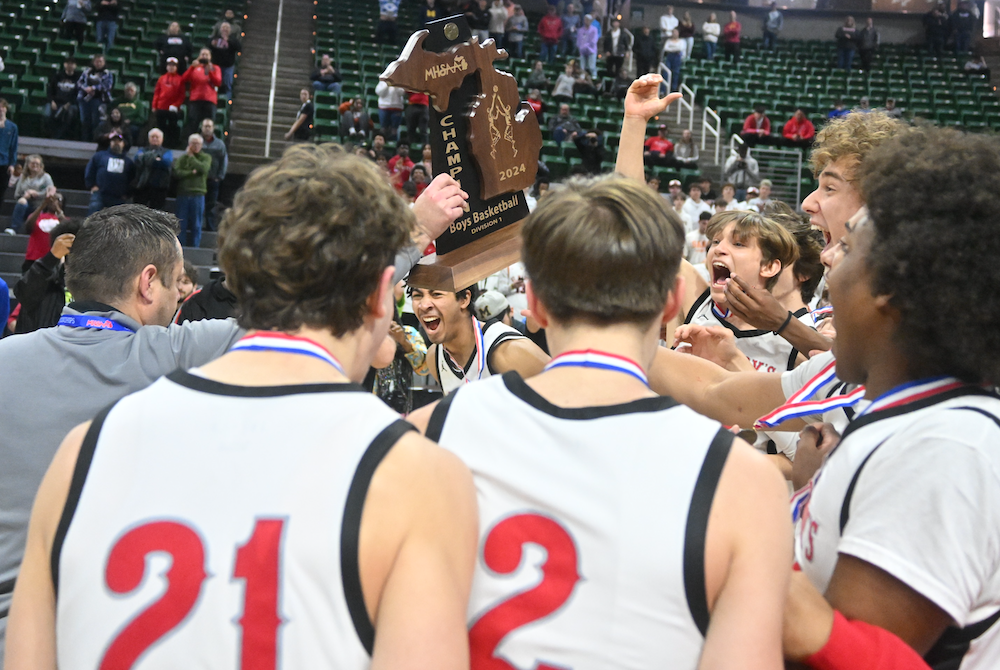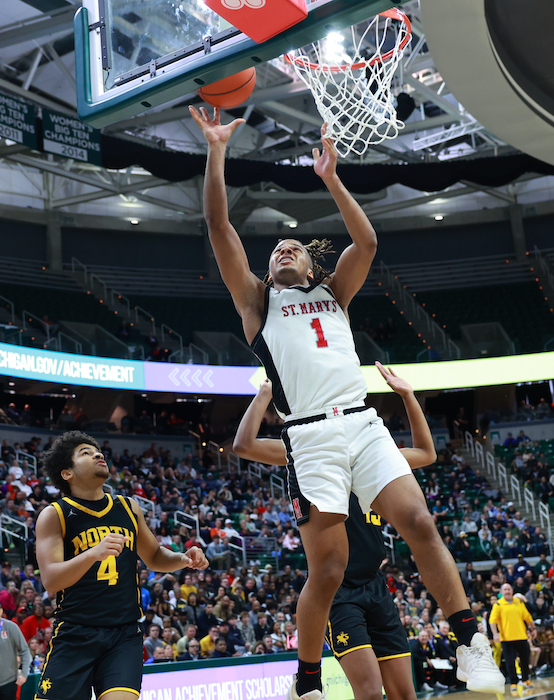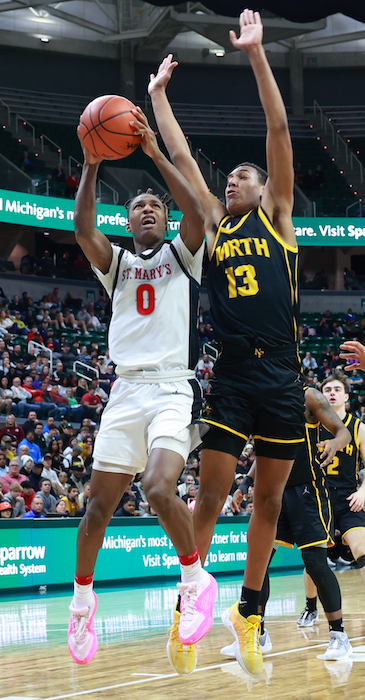
Detroit 'Longtime' Boys Coaches Down to Few
By
Tom Markowski
Special for Second Half
December 14, 2016
Gary Fralick considers himself one of the fortunate ones.
 Fralick, 66, is in his 32nd season as a head boys basketball coach. He retired from his teaching position in 2013. He started coaching at Redford Thurston in 1979, went to Royal Oak Kimball in 1984 and is in 23rd season as the head coach at Troy.
Fralick, 66, is in his 32nd season as a head boys basketball coach. He retired from his teaching position in 2013. He started coaching at Redford Thurston in 1979, went to Royal Oak Kimball in 1984 and is in 23rd season as the head coach at Troy.
Fralick might be lucky, but he is unquestionably rare. Fralick is believed to be one of three coaches in the Macomb/Oakland/Wayne area who has coached for more than 30 seasons.
There’s Dan Fife at Clarkston and Kevin Voss of Clinton Township Chippewa Valley, both of whom in their 35th seasons, all at the same school.
Another, Greg Esler at Warren DeLaSalle, is in his 30th season. He was the head coach at St. Clair Shores Lake Shore for seven seasons before going to DeLaSalle in 1994.
“We’re part of a dying breed,” Voss said.
It certainly appears so. Coaching longevity has taken on a different meaning recently. Twenty seems like a lot in these times, and in reality it is a long time. Twenty years or so ago, 20 years was normal. There’s a new normal, and 20 or 25 years isn’t it.
Many factors have contributed to this change. A person’s personal and family life often don’t coincide with the demands of coaching basketball. The responsibilities that come with coaching have increased. Some coaches say that to be an effective coach, it can be a 10- or 11-month job.
Two factors are at the forefront, and they are both financial. Coaches used to be educators as well as coaches. Yes, coaching can be viewed as teaching on the court, but at one time teaching in a classroom and coaching used to go hand in hand.
 Then there’s the subsidy coaches receive. It varies from school district to school district. Some make $4,000 a season, others can make $7,000. And it also costs money to run a program; unless the coach receives financial help from a booster club or parents, the money he or she receives begins to dwindle.
Then there’s the subsidy coaches receive. It varies from school district to school district. Some make $4,000 a season, others can make $7,000. And it also costs money to run a program; unless the coach receives financial help from a booster club or parents, the money he or she receives begins to dwindle.
But the most important factor is time.
“A tremendous amount of time is devoted to watching DVD or tapes,” Fralick said. “I know I’m dating myself with saying that. The point is, you’re watching a lot. There’s more scouting. And you don’t get paid much. Why don’t they stay as long as they used to? They get burned out. They want to spend more time with their families.
“You don’t see as many of the young coaches stay. Coaches don’t have the ambition to coach a long time. It’s not a profitable job. I don’t know what other coaches make. We used to compare what we made. Not anymore.
“Thirty years or more? I don’t see it happening. There’s the dual job thing. Things have changed. To me, it’s been a great job.”
To compensate for being away from home, Fralick brought his family with him. Sort of. He coached his son Gary, Jr., and Tim. Gary, a 1996 Troy graduate, played for his father his junior and senior seasons and Tim, a 1999 graduate, played four seasons on varsity. Fralick said he was even more fortunate to coach both on the same team (during the 1995-96 season).
Then there’s his wife, Sharon, who remains the scorekeeper.
“I’ve always had a passion for coaching and teaching,” Fralick said. “I love the game of basketball. I love the kids. There’s never a dull moment. It’s been a great ride.”
Vito Jordan has been around basketball all of his life. His father, Venias Jordan, was the boys head varsity coach at Detroit Mackenzie and Detroit Mumford before stepping down as a head coach only to return to the bench assisting his son the last six seasons.
Vito Jordan, 31, became a head coach at Detroit Osborn when he was 24. He started his coaching career the year before as an assistant to Henry Washington at Macomb College. Jordan went to Detroit Community after one season at Osborn and guided Community to its only MHSAA Finals appearance (Class B, 2013). He’s now in his fourth season as the head coach at Detroit Renaissance.
“I followed my father all of my life,” Jordan said. “I knew what I wanted to do when I was in college (Alma College). This is what I want to do the rest of my life.”
It’s different in Detroit. Schools close. Job titles change. Jordan, for instance, teaches at the Academy of Warren, a middle school in Detroit. It’s a charter school, not within the Detroit Public School system, therefore he receives his pay from two separate school systems (Renaissance is in the DPS).
There is a distinction. In some school systems coaches will receive a percentage – let’s say for argument sake, 10 percent – of their teaching salary to coach. Let’s say a person makes $60,000 a year to teach. He or she would then receive $6,000 to coach. If you coach two sports, that’s $12,000.
 Jordan is not privy to such a contract. Each job is separate. Jordan loves to coach, and he understands he must be a teacher to earn a decent living, and he’s content to continue on the path he is following. But he also knows that to make a good salary just coaching one must move on to the collegiate level like others have done.
Jordan is not privy to such a contract. Each job is separate. Jordan loves to coach, and he understands he must be a teacher to earn a decent living, and he’s content to continue on the path he is following. But he also knows that to make a good salary just coaching one must move on to the collegiate level like others have done.
“When there were coaches like my dad, Perry Watson (Detroit Southwestern), Johnny Goston (Detroit Pershing) and others, they all worked in the (Detroit Public) school system. Everyone was teaching. That was your career. None of them had aspirations of being a college coach. Not even Watson. Now everyone isn’t in the teaching profession. Maybe they do have a degree and maybe they don’t. The point is, most aren’t teachers. I can count on one hand those (in Detroit) who have their teaching certificate and coach.”
Jordan noted such successful PSL coaches like Derrick McDowell, Steve Hall and Robert Murphy who left high school to pursue a coaching career in college. Murphy guided Detroit Crockett to the Class B title in 2001 and is now the head coach at Eastern Michigan. McDowell has had two stints as a collegiate assistant coach, most recently at EMU. He’s since returned to coach at Detroit Western. Hall coached Detroit Rogers to three consecutive Class D titles (2003-05) before going to Duquesne University and Youngstown State as an assistant coach. Hall returned to Detroit last season and is in his second season as head coach at Detroit Cass Tech.
Jordan said they left high school to challenge themselves professionally, among other considerations. Voss said there are variables that influence how long a person lasts, in one school district or in coaching in general, that didn’t exist 20 years ago.
“Athletics have become pervasive in high school,” he said. “The whole booster situation you find in college is here. You can be winning but not winning enough. It’s a trickle down affect.
“Coaches complain about parents. Parents complain about playing time. High school sports is not as pure as it once was. Winning is way more important now. Now a coach comes in with a three-year window. You can have one or two down years, and the third you’d better win.
“Then there’s the pressure on your family. I’ve been lucky. My wife and I have had the players over for team dinners. We create a family atmosphere. It’s a change of society. I don’t envy the young coaches coming in.”
Community involvement has always been a priority for Voss. To keep a hand on the pulse, Voss heads the elementary basketball program within the Chippewa Valley school district. Games are held on Saturdays, and approximately 750 students take part.
“You have to have the right fit,” he said. “I’m in the right spot. You coach for different reasons when you get older. I’m enjoying the game. There’s a different level of satisfaction.”
 Tom Markowski is a columnist and directs website coverage for the State Champs! Sports Network. He previously covered primarily high school sports for the The Detroit News from 1984-2014, focusing on the Detroit area and contributing to statewide coverage of football and basketball. Contact him at [email protected] with story ideas for Oakland, Macomb and Wayne counties.
Tom Markowski is a columnist and directs website coverage for the State Champs! Sports Network. He previously covered primarily high school sports for the The Detroit News from 1984-2014, focusing on the Detroit area and contributing to statewide coverage of football and basketball. Contact him at [email protected] with story ideas for Oakland, Macomb and Wayne counties.
PHOTOS: (Top) Troy boys basketball coach Gary Fralick, left, is in his 32nd season coaching. (Middle) Detroit Renaissance boys coach Vito Jordan is following in the coaching footsteps of his father, Venias. (Below) Chippewa Valley boys coach Kevin Voss, left, is in his 35th season at his school. (Top and below photos courtesy of C&G Newspapers; middle photo courtesy of Detroit Public School League.)

McKenney Grows Legend in Leading St. Mary's to 1st Title since 2000
By
Keith Dunlap
Special for MHSAA.com
March 16, 2024
EAST LANSING — At one point early in the fourth quarter of Saturday’s Boys Basketball Division 1 Final, Orchard Lake St. Mary’s junior Trey McKenney had scored as many points as North Farmington had as a team.
That pretty much tells the story of who the man of the day — and arguably the season — was for 2023-24.
McKenney showed why he is one of the most highly-regarded juniors in the entire country, finishing with 32 points to lead St. Mary’s to a 63-52 win over North Farmington and its first Finals title in Division 1 or Class A, the predecessor division for the state’s largest schools.
“We’ve been going at it every day,” McKenney said. “Just being consistent. I don’t think it’s really sunk in, winning a state championship. It’s kind of crazy.”
 McKenney finished 8 of 11 from the field overall and made all 14 of his free-throw attempts. He added 10 rebounds.
McKenney finished 8 of 11 from the field overall and made all 14 of his free-throw attempts. He added 10 rebounds.
After the game, North Farmington head coach Todd Negoshian could only ask, “Can he graduate early?”
“He’s tough. He does a lot of things. He’s got the NBA style game right now with floaters and fadeaways. He’s so strong,” Negoshian added.
St. Mary’s (27-1) won its fifth Finals title and first since earning the Class B crown in 2000.
Ranked No. 1 for most of the year, the Eaglets navigated through that high expectation and all the way to the top of Division 1 after losing in a Semifinal last year.
“We’ve been dreaming about this a long time,” St. Mary’s head coach Todd Covert said. “This is a dream come true. It means everything.”
St. Mary’s was in control throughout, until late in the game when North Farmington made things interesting.
Trailing 46-26 with 6:27 remaining, North Farmington amped up its full-court pressure, created turnovers and did something it struggled to do prior to that point – make shots.
The Raiders cut their deficit to 59-50 with 1:46 remaining after a free throw by senior Landon Williams, making up much of the margin despite leading scorer Tyler Spratt fouling out with 3:27 left when St. Mary’s was up 55-39.
But that was as close as the Raiders could get, as McKenney essentially wrapped up the game by hitting two free throws with 12.9 seconds remaining to give the Eaglets a 63-52 lead.
St. Mary’s made 17 of 18 shots from the free-throw line during the fourth quarter.
 “That was the longest fourth quarter of my life,” Covert said. “It seemed like there was seven guys out there. But we weathered the storm, and that is what it’s all about.”
“That was the longest fourth quarter of my life,” Covert said. “It seemed like there was seven guys out there. But we weathered the storm, and that is what it’s all about.”
Spratt finished with 17 points, and Williams had 16 to lead the Raiders (24-3).
Saturday was North Farmington’s second championship game appearance after the Raiders faced a similarly elite player in Cassius Winston with Detroit U-D Jesuit in 2016.
“I thought we wore them down a little bit to where they ended up turning the ball over,” Negoshian said. “I thought we struggled to score at times. I think we got it to where we wanted to with them turning it over and keeping us right where we needed to be within striking distance. But we just couldn’t score at times offensively, and I think that was our downfall tonight.”
Trailing 25-19 at halftime, North Farmington cut the St. Mary’s lead to 25-22 with 6:56 left in the third quarter on a 3-pointer by Rob Smith.
But McKenney answered by scoring the next seven points, and then senior Andrew Smith drained a 3-pointer from the top of the key to give the Eaglets a 35-22 lead with 3:17 remaining in the third. McKenney then hit a jumper from the baseline to finish off a 12-0 run and push the lead to 15.
PHOTOS (Top) Orchard Lake St. Mary’s coach Todd Covert presents the Division 1 championship trophy to his players Saturday at Breslin Center. (Middle) The Eaglets’ Trey McKenney (1) gets to the basket for two points. (Below) St. Mary’s Sharod Barnes (0) gets a shot up with Dylan Smith (13) defending. (Photos by Hockey Weekly Action Photos.)

